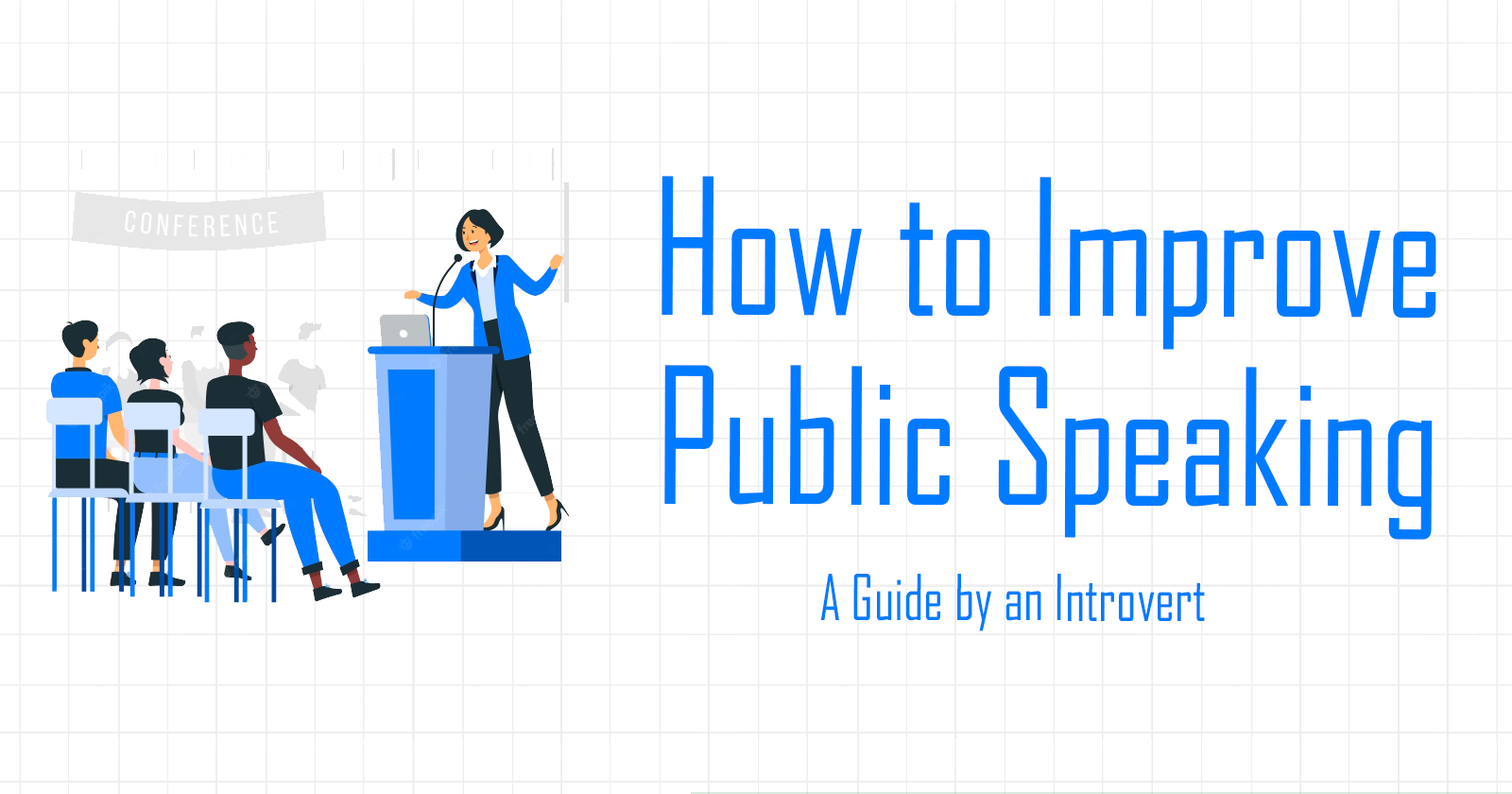Enhancing Public Speaking Skills: A Guide by an Introvert
My Practical Tips for Improving Public Speaking Skills + 3-year anniversary on Hashnode!

Public speaking can be a daunting task for many people, especially for introverts who may feel uncomfortable in large groups or social situations. However, with a bit of preparation and practice, introverts can improve their public speaking skills and feel more confident in presenting their ideas and thoughts in front of an audience.
Hello everyone, in this article, I would like to share my personal tips on how to improve public speaking.
Before we begin, I just want to quickly highlight that today is my 3rd year writing on Hashnode!
What 3 years of Hashnode Felt Like
Thanks to writing on Hashnode and being part of the community, I have gone beyond just becoming a writer. I am also now a speaker, WomenWhoCode leader and GitHub Star!
It's been an awesome journey and I want to take this opportunity to thank the Hashnode family for always empowering writers to not only be the best blogger they can be, but also the best community contributors they can be!
I think sharing about how to improve public speaking in this article is the perfect topic for this special day, as Hashnode was one of the first communities that I publicly speak for 3 years ago.
The Struggle is Real - Introvert or Not
Before we get into it, first I want to acknowledge that getting better at public speaking is not something exclusively for introverts only. However, I see that among my friends and people I know, introverts generally find it harder to speak in public settings.
My personal struggle was real. I was an introvert with zero confidence, and I would freeze up just talking to a classroom of 30 students. I realized my poor public speaking skills were attributed to the following reasons:
Not enough opportunities to speak in public
Relying too much to read word-by-word on the script
Not enough preparation and practice
Not monitoring and reflecting back on previous speaking engagements
Focused too much on mistakes and not learning from them
What makes a great public speaker?
Before discussing tips for enhancing public speaking skills, let's first identify some of the characteristics that make a public speaker outstanding.
Although I have improved as a speaker since my initial presentation, there is still much for me to learn. I do not consider myself an exceptional public speaker, and so I often wonder what constitutes a great one and how I can strive to be better.
To me, when I see a speech that makes me go "wow", the speaker is usually:
Engaging and actively interacting with the audience
Charismatic and has stage presence, you can't help but listen
Passion about what they talk about and seem genuine/authentic
Speaking with clarity, confidence, organization and excellent diction
Incorporating gestures and body language to emphasize points
Maintaining a lot of eye contact with the audience
Adapting their pacing to the audience (like waiting for the audience to finish reacting)
Now that we have established a few traits of what makes a great public speaker, let's discuss some practical tips to improve public speaking.
Tips to Improve Public Speaking
If you search "how to improve public speaking," you'll likely find numerous articles suggesting that you practice more, speak with greater confidence, and so on. While these recommendations are indeed valid, they can be quite vague.
Therefore, I would like to provide more detailed tips based on my personal experience.
1. No more scripts on hand
When I first started public speaking, I thought bringing in a script or cue cards was the right thing to do. That way, my mind won't go blank and I would be able to say everything I prepared.
But soon, I realized that relying on scripts will not improve my public speaking. In fact, it made my speech sound overly robotic and monotonous. The audience quickly became disconnected and unengaged.
Also, looking at my script or cue cards so often would result in a lack of eye contact with the audience, causing them to lose focus easily.
This was the first change I made that improved my public speaking skills. Because I no longer carry a script or cue cards when I'm presenting, I made more eye contact and I speak in a more natural flow with the audience.

2. Pausing
Many public speakers, including myself, would talk really fast without stopping when we are feeling nervous. At that moment, I thought I was talking and articulating my points well but when I monitored myself, I was clearly speaking too fast. This made it challenging for the audience to grasp the key points I wanted to convey.
Pausing is a powerful public speaking technique that can be used to emphasize key points, create suspense, and engage the audience. When used effectively, pauses can also help the speaker to collect their thoughts and maintain composure during their presentation.
After I started incorporating pauses into my talks and presentations, many told me that I seem more confident; even if in reality, I was sweating from nervousness during the whole talk.
3. Speak with Passion
As someone who has attended numerous conferences and watched countless TED Talks and public speaking videos, I've observed that I tend to concentrate and enjoy presentations delivered by speakers who are evidently passionate about their subject matter.
There is something truly captivating about a speaker who exudes enthusiasm and excitement for what they are sharing, and it makes their message all the more powerful. Whether it's a technical topic or personal story, a passionate speaker has a way of making their audience feel invested and interested in their message.
Putting passion into your talk does not mean you have to speak loudly. While it's true that some speakers use volume to convey their enthusiasm, I've found that a soft-spoken speaker can be just as effective.
The key is to convey passion through the tone and inflection of your voice, rather than just the volume. A speaker who speaks with conviction and emotion, even in a quiet tone, can capture the audience's attention and convey their message in a powerful way.
So if you're naturally soft-spoken, don't be afraid to speak at your most comfortable volume and focus on the genuine passion and your tone to display that quiet confidence.
4. Be yourself
When I was researching how to be a better public speaker, a common tip that a lot of articles stated was that "adding humour" would be a good way to interact and engage the audience.
However, despite the widespread recommendation, I know very well that I'm just not the type to crack jokes in the middle of a talk and I can't naturally blend humour in my words. Forcing myself to do so would feel inauthentic and forced.
Instead, I've learned to focus on other techniques, such as storytelling, to connect with my audience and make my presentations more engaging. After all, being true to yourself and your own speaking style is the key to connecting with your audience and delivering a memorable talk.
5. Accept mistakes & find opportunities
If you've read any of my personal blog articles, you might know that I have a tendency to be a bit of a perfectionist. I'm always striving to improve myself and my skills, which can sometimes lead me to be overly critical of myself.
This trait carried over into my early experiences with public speaking, where I found myself feeling discouraged and demotivated after making even the smallest mistake. It felt like my mistakes were evidence of my incompetence, and I began to doubt if I could ever improve my speaking skills.
Eventually, I learned to approach mistakes with a different mindset. Instead of viewing mistakes as a sign of failure or incompetence, I began to see them as opportunities for growth and improvement. I learned to be more forgiving of myself, recognizing that making mistakes is a natural part of the learning process.
Whenever an opportunity to speak came up, whether it was for volunteer work or school activities, I would raise my hand. Now, saying 'yes' to speaking opportunities became almost a habit.
Gradually, I became more confident in my speaking abilities, and I now enjoy sharing my knowledge and insights with others through Twitter Spaces, talks, panel discussions, etc.
Conclusion
Through my experiences, I have come to believe that self-compassion and perseverance are essential qualities for anyone seeking to improve themselves and achieve their goals.
Public speaking is a skill that anyone can learn and master. Practice with the intention to improve and use my tips if they help. Also, don't be afraid to ask for a recording to monitor yourself or even ask for feedback from others.
If you are looking for opportunities to speak, my dear friend, Tapas Adhikary has recently started a bi-weekly public speaking initiative called "Open Mic" for anyone to talk about tech, open source and software development. Do check it out here for more details!
I have included some talks I've enjoyed and learned some public speaking skills from. These are all amazing speakers who speak with enthusiasm, confidence, well-paced articulation and great body language.
Thanks for reading! I hope this article has provided you with some practical tips to improve public speaking. Do share your thoughts on the tips or on your experience with public speaking. Feel free to like and share this article if it is helpful! Cheers!




